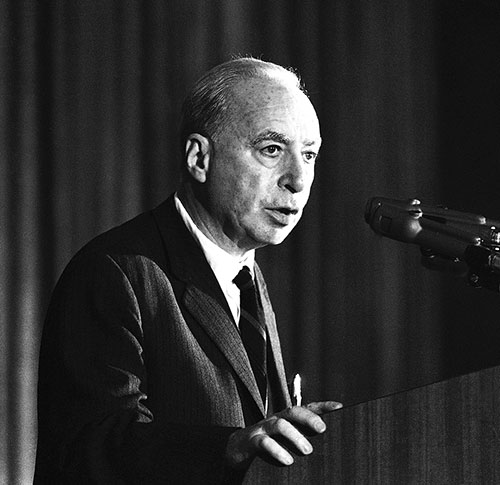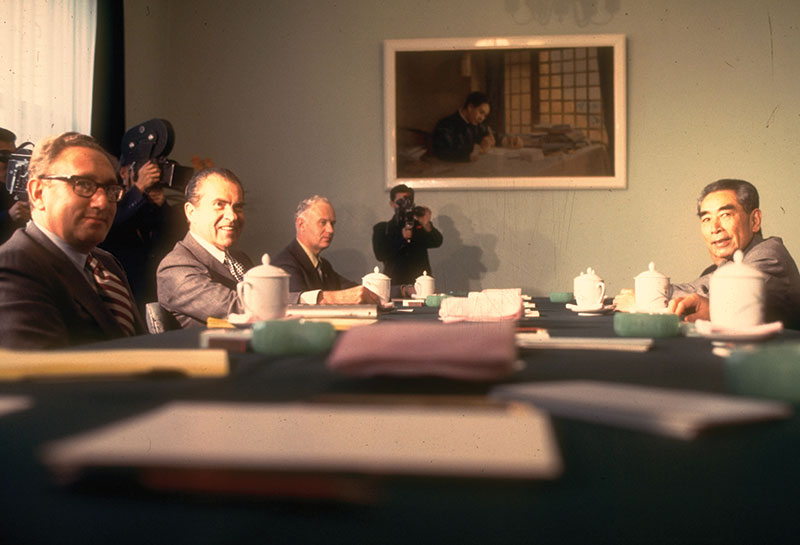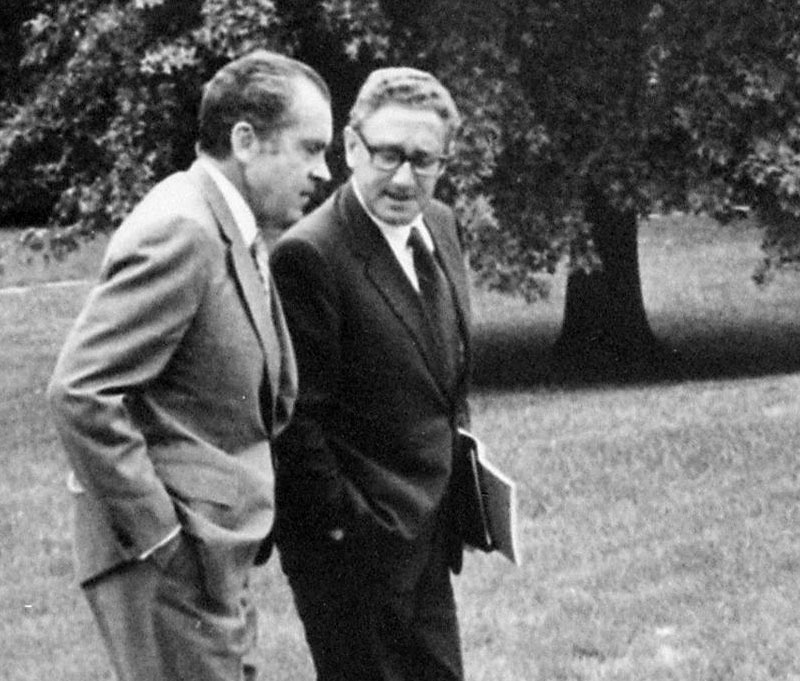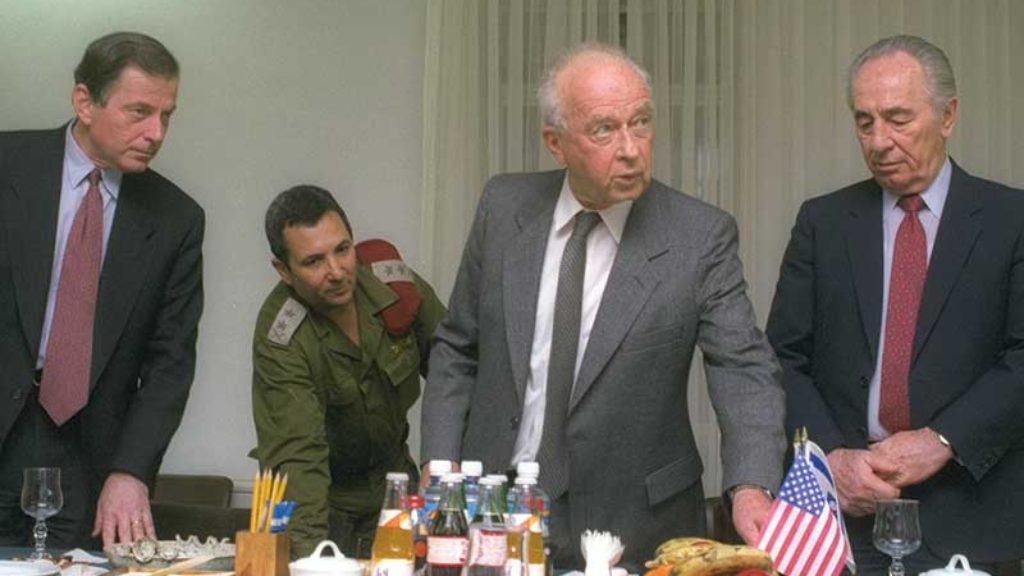Tragedy and Power
Like most other foreign policy hands of my generation, I have been fascinated by Henry Kissinger for as long as I can remember. When I read his first books, A World Restored, Nuclear Weapons and Foreign Policy, and The Troubled Partnership, in graduate school, I learned how the Congress of Vienna produced global stability and how artful diplomacy perpetuated it, how nuclear weapons transformed international relations, and how to understand and manage tensions in the NATO alliance. Later, from reading his memoirs of his time at the White House and the State Department, I gained greater insight into his pragmatic, piecemeal approach to negotiations. The interim agreements he mediated between Israel and Egypt and the disengagement he brokered between Israel and Syria after the Yom Kippur War were often on my mind during my own work as an American diplomat in the Middle East.
For the first two years of his administration, Nixon had largely excluded Kissinger from Middle East diplomacy, fearing that his Jewishness would make it hard to restore ties with Egypt and Syria. Ironically enough, it was Kissinger who renewed America’s relations with both countries. His fundamental concept, with which the State Department disagreed, was that key Arab leaders needed to see that the Soviets could not help them regain the land Israel had occupied after the 1967 and 1973 wars and that the United States could. But for that to happen, America had to maintain a relationship of trust with Israel, one that would enable the Israelis to feel that we could be counted on to stand by them in the most difficult times and meet their security needs. And they also had to know that even as we brokered Israeli withdrawals, we would always have Israel’s back.
These working principles remained essential to me. But I also learned something else from Kissinger: Only go for agreements that are within the realm of possibility; don’t try to shoot the moon. Accept the fact that an incremental approach makes sense in circumstances where the very act of reaching an agreement about anything can show each party that something can be done with the other. As things proceed, limited agreements on the more fundamental issues may be attainable, and peace might even come within reach.
Kissinger eschewed a comprehensive approach to peace in the Middle East not because it was undesirable but because he knew it was unachievable. I shared that assessment until 2000, seven years after the Oslo Accords. The Israeli government believed that it was time to try to settle the conflict, and I thought a comprehensive, final deal might finally be in the cards. That turned out to be wrong, largely because Yasser Arafat was incapable of walking away from the conflict. The struggle defined him, and he could not transform himself. Now, 20 years later, with both Israelis and Palestinians having lost faith in each other, a Kissingerian approach seems the only way forward. (The recent breakthrough between the United Arab Emirates and Israel follows this approach. It did not bring peace between Israelis and Palestinians, but it did signal that other Arab states won’t wait forever for that peace. Simultaneously, it showed that normalization will be linked to Israel’s relations with the Palestinians. In this case, the Emirates required that Israel not unilaterally annex the territories in the West Bank allotted to it in the Trump Peace Plan. Other Arab states are likely to condition their moves on positive Israeli steps toward the Palestinians—e.g., releasing prisoners or limiting settlement activity or increasing the territory in the West Bank that Palestinian Authority can govern.)
As someone who had long studied Kissinger, taught his books in my classes, and met with him from time to time, I was convinced that I understood his approach to international relations. And yet, Barry Gewen’s new book comes as something of a revelation. Kissinger’s life story—from his childhood in Germany to his return to Germany as a US soldier, and on to his academic triumphs at Harvard and beyond—has been told many times, but Gewen’s book is more than a biography; it is a thorough exploration of Kissinger’s world- view and how he came to it. For Gewen, it is impossible to understand Kissinger’s conceptual approach to international politics without understanding the profound impact that living in Nazi Germany as a child, until his family fled to America in 1938 when he was 15 years old, had on him.
As a young boy, Kissinger and his family lived a comfortable middle-class existence in Furth, a city that had been relatively tolerant of Jews before the rise of the Nazis. His father, Louis, was a teacher and an observant Jew who identified strongly with German culture. He lost his job and most of his friends after the passage of the Nuremberg Laws in 1935, but still couldn’t bring himself to leave. Fortunately, Kissinger’s mother, Paula, was less sentimental. A cousin in the United States helped the Kissingers come to America in August of 1938, not long before Kristallnacht. In all, Kissinger would lose 13 members of his extended family in the Holocaust. His father, Louis, Gewen writes, “was never the same.”
His unswerving loyalty to the Fatherland had been stolen from him, and he had nothing to fall back on. All his assumptions about himself and his life, all his expectations, had been smashed to pieces. He was a broken man.
Gewen argues that the arc of his father’s life had a deep impact on the moral development of Kissinger as an adolescent, even suggesting that “it would be hard, even misguided, for any Kissinger biographer to resist the temptation of seeing Kissinger’s attention to the realities of power as compensation for his father’s powerlessness.” He cites a letter at the end of World War II, in which Kissinger writes that “weakness [is] synonymous with death.” Maybe, but even if his view of power was not some form of compensation, Kissinger had good reason to see the world through untinted glasses. In words that Gewen also quotes, Kissinger declared, “I had seen evil in the world.” And, of course, he had.

Psychology, however, is only part of the explanation. To elucidate the nature of Kissinger’s conceptual framework, Gewen analyzes the thinking of three other German Jewish intellectuals who also fled Nazi Germany, found refuge in the United States, and drew broad, sweeping lessons about the meaning of the collapse of the Weimar Republic and the rise of Hitler: Leo Strauss, Hannah Arendt, and Hans Morgenthau. They, too, had seen evil and thought deeply about what gives rise to it. Having observed Hitler’s ascent to power, they understood the fragility and unreliability of democratic institutions.
Strauss and Arendt rejected the idea of man’s essential goodness after their direct experience of his inhumanity. They were “confirmed freethinking individualists,” but they didn’t trust “liberals” who tolerated extremists, failing to recognize the threat they ultimately pose to the very fabric of society. They also didn’t believe in utopian solutions to conflict, which they saw as inherent in human nature. They understood the yearning for peace but feared weakness in the face of totalitarian tyrants. Strauss could have spoken for both of them when he referred to the “sorry spectacle of justice without a sword or of justice unable to use the sword.” Strauss and Arendt “deserve special attention,” Gewen writes, “for the window they can provide into Kissinger’s mind.” But, he admits, neither “had any lasting ties to him.” The link between them and Kissinger was Strauss’s academic colleague, Arendt’s close friend, and Kissinger’s mentor: Hans Morgenthau.
Morgenthau arrived in the United States in 1937, a year before Kissinger, not as an adolescent but as a 33-year-old law professor whose career at the University of Frankfurt had been ended by the Nazis. He arrived in America with shaky knowledge of English and few job prospects. He turned down an offer to be an elevator operator before landing “a temporary post teaching night school at Brooklyn College.” One very arduous and hugely productive decade later, he was a tenured professor at the University of Chicago. Following the publication of his masterwork Politics Among Nations in 1948, he became a central figure in political science. “By the time of the second edition in 1954, he was being called ‘world-renowned.’”

Morgenthau was effectively the
founder of the school of Realism in international relations, which Gewen sums
up very well: History shows that men will always strive for power;
consequently, mere good intentions cannot prevail in the anarchic world of
international affairs. To prevent war, one must be prepared to wage it. Moral
imperatives cannot guide policy because they tend to lead sooner or later to excesses,
to absolutes. International law won’t end conflicts or preclude them or even
provide limits
unless nation-states decide that respecting it is in their national interests.
The form of government does not matter; geography, history, and national character
do. Finally, democracies are no more likely to be peace loving than
authoritarian states.
Morgenthau was not amoral, nor did he believe that morality had no role in international politics. Preventing war, after all, is a moral necessity, especially in the nuclear age. Morality can create boundaries, but it is up to nation-states themselves to decide whether to respect those boundaries. What can induce them to do so? The only means, Gewen paraphrases Morgenthau, for “curbing humans’ unalterable lust for power” is to neutralize “it by setting off force against force through a balance of power.” For Morgenthau, the balance of power “was as old as political history itself” and an “essential stabilizing factor.”
In other words, “Realism” meant not fantasizing about ending conflict but limiting it, managing it, and deterring it. Nation-states were the foundational element of international relations. They would follow their interests, and those that were aggressive had to be confronted with countervailing pressure and force where necessary. Preventing powers from gaining hegemony was essential, and, while there was evil in the world, demonizing adversaries made it difficult to reach understandings when they might otherwise be necessary and attainable.
This is very much the world that Kissinger saw. The two men first met when Morgenthau was a visiting professor at Harvard in the early 1950s and Kissinger was already a legendary graduate student. Their immediate rapport led to close intellectual ties that had palpable repercussions. “Morgenthau’s fingerprints,” Gewen writes, “were all over Kissinger’s first book,” A World Restored. And as Kissinger said of Morgenthau years later, even after disagreements about Vietnam, Soviet Jewry, and other matters, “I never ceased admiring him or remembering the profound intellectual debt I owed him.”
The balance of power has been Kissinger’s guiding concept both as a historian and as a diplomat. He has never believed that democracy is a universal imperative, or in the inevitability of progress. According to Gewen, he holds that the aim of foreign policy is “not to steer the world along some preordained path to universal justice but to pit power against power to rein in the assorted aggressions of human beings and to, try as best they can, to avert disaster” and preserve equilibrium. Power is necessary, and force may be required, but force must be seen through the lens of diplomacy, not as a substitute for it: “Force might conquer the world but it could never legitimize itself” in the eyes of the defeated. Generals wage war; diplomats construct peace.

When, with Nixon, he contemplated the opening to China, Kissinger said he “was thinking of China as a road to balance the Soviet Union.” When clashes took place along the Soviet-Chinese border in the summer of 1969, he and Nixon “came to the conclusion, which was sort of a balance-of-power one, that if you don’t know what to do, support the weaker against the stronger.”
In his opening chapter on the Nixon administration’s policy toward Chile and, in his later, extensive discussions of its Vietnam policy and its pursuit of détente, Gewen seeks not only to understand Kissinger’s approach but to defend it. Critics have often accused him of sabotaging the democratically elected regime of Salvador Allende, but, from Kissinger’s point of view, the Castro-like Allende threatened to strengthen the Soviet presence in the Western Hemisphere, which had to be stopped. In Vietnam after 1969, the United States had no good options, and Kissinger sought an exit. But it had to be one that would not weaken American credibility, since Kissinger considered it essential for our allies to know they can count on us and for our adversaries to know that they cannot challenge us.
As for the policy of détente with the Soviet Union, it was necessary for managing a world in which nuclear weapons could threaten humanity itself. But Kissinger’s commitment to détente also showed how out of step he was with the American ethos of democratic exceptionalism. Senator Henry “Scoop” Jackson, one of détente’s fiercest critics, described the policy as “a body without a soul—a policy indifferent to human rights.”
In an idealistic America, Kissinger was a realist, the proponent of a stance that, in his own words, lacked “a ready constituency.” This, according to Gewen, is unfortunate. He is deeply troubled by the chaos that characterizes not just international relations but the failure of Americans to comprehend them. He sees in Kissinger’s Realism “the possibility of rationality, coherence, and a necessary long-term perspective at a time when all three of these qualities seem to be in short supply.”
American hegemony, Gewen says, is not sustainable or even possible, and as Kissinger long ago concluded, it was not even in our interests because it was bound to “gradually unite the world against the United States.” But the balance of power is different; it is sustainable because it is largely ruled by reason and interests, and because it relies “on negotiation and compromise instead of compulsion and emotion.” Kissinger argued—and Gewen clearly agrees—that the balance of power was the one system that managed to create order out of diversity, and “our age is insistently, at times almost desperately, in pursuit of a concept of world order.”
Gewen’s book is, then, not just an intellectual biography but an argument about what the American role in the world ought to be and the structure of international relations we should aim to achieve. Here he joins a thriving cottage industry of those now trying to define a new American approach to the world. I count at least five other schools in the mix. Like Gewen, they are responding in different ways to our overreach and the failures of globalism.
There is the America First school, which President Trump represents, and which draws its inspiration from an emerging new school of nationalist intellectuals who advocate for the importance of national sovereignty against imperial overreach. On first blush, this might sound like Kissinger and Morgenthau’s Realism, but it bears little in common with their conception since there are no allies or enduring interests other than what serves the state. This leads to a transactional foreign policy that tends to be focused on short-term gains and seems clearly to fall short in dealing with global problems like pandemics.
Next, we have the “restrainers,” a group represented by the recently founded Quincy Institute, which makes foreign policy arguments amenable to both Senators Bernie Sanders and Rand Paul. Both its left- and right-wing constituents are united by the view that America’s pursuit of hegemony is to blame for so much of the world’s disorder. Thus, the United States needs to demilitarize its foreign policy approach and cut back on its military presence overseas. The striking characteristic of this group is that it recognizes no predatory powers in the world: the actions of China, Russia, and Iran are almost inevitably understood as defensive. Strauss’s recognition that there is no justice without the sword is utterly alien to this group.
Then we have those who believe the answer lies in recognizing spheres of influence, whose most thoughtful proponent is Harvard professor Graham Allison. His fear of China’s rise and the “Thucydides Trap”—the increased risk of war when a rising power seems poised to displace an existing great power—drive his arguments. For him, the key to avoiding both conflict and imperial overreach is to recognize China’s and Russia’s spheres of influence. There are at least two problems with this approach: First, it dooms all those countries in the Chinese, Russian, and (to a much lesser degree) Iranian spheres to their domination. Second, it assumes that the spheres of influence are static rather than expanding. This may actually increase the potential for conflict as the limits of the spheres are tested and become points of friction.
The quasi-Realists, led by John Mearsheimer and Stephen Walt, make up the fourth school. Like Morgenthau, they are true adherents of the balance of power. They don’t believe, however, that we need the military presence we presently have in Europe or Asia, arguing that our allies and partners can carry a far greater load. They are “off-shore balancers” and have their share of followers, especially when it comes to the Middle East. What distinguishes them from Morgenthau or Kissinger is their rejection of active American leadership (and the prudent use of force necessary for such leadership).
Finally, there are those, such as Robert Kagan and John Ikenberry, who remain committed to a liberal, rules-based international order. They point out that the international order that the United States put together and sustained in the seven decades following World War II provided relative peace and increased global prosperity. They do not deny that it had flaws, including US imperial overreach on the one hand and a lack of burden sharing on the other. Still, they nonetheless argue it remains far superior to any of the alternatives. Here the problem is one of convincing the American public of our ongoing responsibilities at a time of understandable fatigue. Just as Kissinger found it hard to sustain a “realist” foreign policy, the Kagan-Ikenberry school seems out of step with public and elite attitudes.
Still, the COVID-19 pandemic may well trigger a new look at the importance of the US retaining the responsibility to mobilize coordinated multinational responses to pandemics and other crises. Similarly, the need to set limits without going to war with China and Russia will also argue for a more activist international American role—one that could certainly draw lessons, as Gewen hopes, from Kissinger’s balance-of-power approach. What the quasi-Realists and the America Firsters fail to understand, it seems to me, is the role of soft power. Soft power is not just a brand that attracts others; it means America stands for certain values that lead others—certainly our allies—to instinctively embrace the objectives we establish. Despite his famously hardheaded Realism, Kissinger understood the importance of American values, often writing that America’s foreign policy could not betray them. But values did not play a central role in the policies he implemented. The soft power he wielded so effectively was the perception of American competence. This, along with his deep sense of the inevitability of tragedy in international affairs, is a legacy that American foreign policy makers would do well to remember.
Suggested Reading
Kissinger, Kant, and the Syrians in Lebanon
A nugget of philosophical diplomacy.
Letters, Spring 2013
Letters from Henry Kissinger and other readers.

A Life with Consequences
Yitzhak Rabin was a realist who saw peacemaking not as the source of security but as a further development that needed to be based upon security.
Do You Want to Know a Secret?
“Who’s this guy,” asked one of my sister’s friends, “who writes about secret truths? I can’t remember his name.”
Comments
You must log in to comment Log In